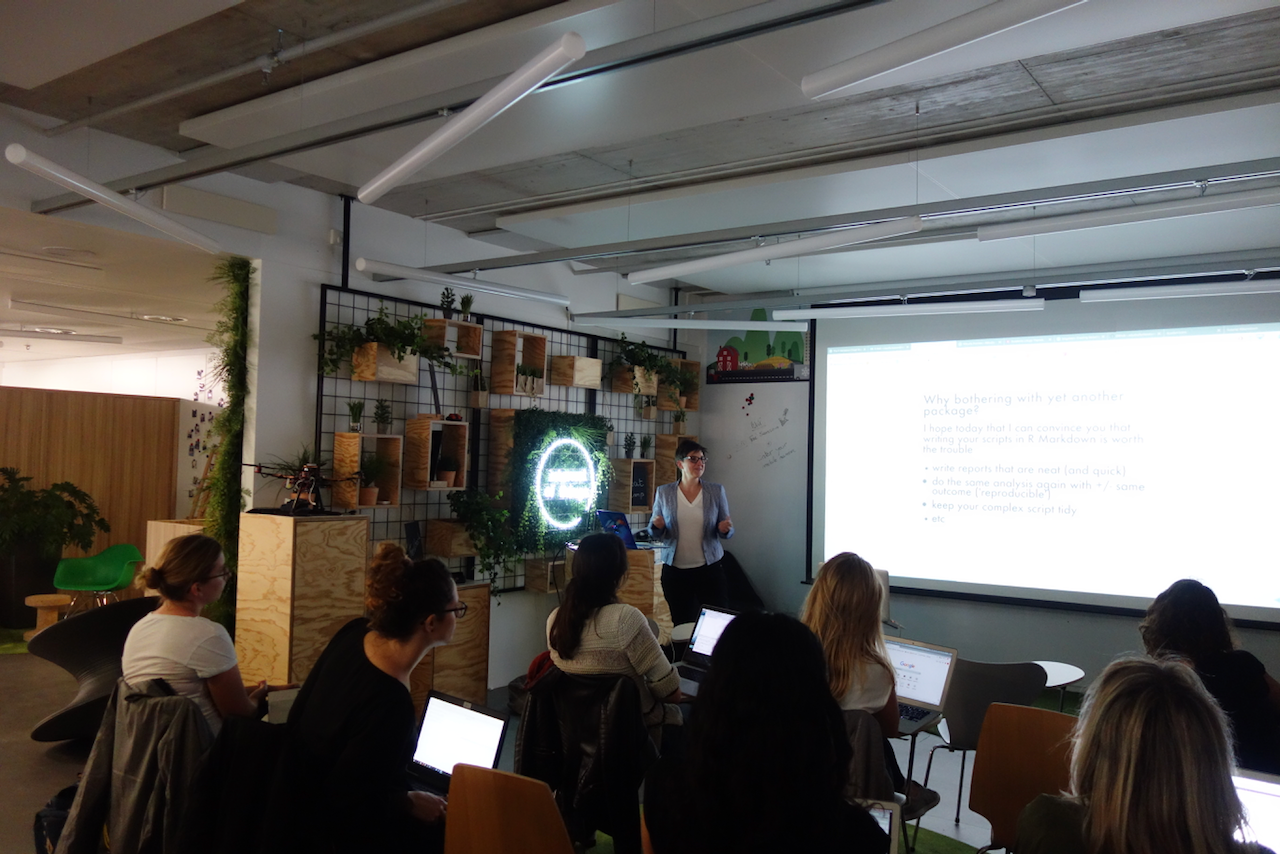I think what I appreciate the most about R, is, how much energy people put into developing packages.
Claudia Kasper gave a presentation about Creating reproducible analyses and reports with R Markdown on October 17 2018, at our 5th meetup.

R-Ladies Lausanne: Can you tell us about the work that you do?
Claudia Kasper: I am a research scientist working on animal genetics at Agroscope, the Swiss research centre for agricultural research. At the moment I am working on a project for sustainable pig breeding where I evaluate the genetic potential of favourable and desirable traits in the Swiss pig population. My project is mostly concerned with metabolic traits, for example the optimal intake of nutrients. The goal is to import less pig food from abroad, especially from countries in which sensitive ecosystems are compromised by the cultivation of feed crops, for instance the South American rain forests.
RLL: What do you use R for at work?
CK: I use R to do quantitative genetics models, mainly Bayesian mixed effect models. And I also use it a lot for data handling, data visualization, and to bring the data into a form in which I can use it.
RLL: Which R-package do you use for Bayesian statistics?
CK: It is called {MCMCglmm} but I want to learn another one more Stan based, called {brms}.
RLL: Where and when did you learn R?
CK: I remember exactly where I was. It was in early 2012 and I was working in Berlin as a research assistant at the Wissenschaftskolleg in Berlin, which is a institute for advanced studies. At that time I was using Mathematica, but it is not free, difficult to get and it does not update that often. And because I needed a specific function, I needed to use R. In the beginning it was difficult to use R because it seemed so counterintuitive compared to Mathematica and importing data was really difficult.
RLL: Did somebody help you or did you learn it all by yourself?
CK: I had some guidance from colleagues that were working in the US at the time and that sent me scripts. Later I did a three-day intensive R-course at the Freie Universität Berlin that was really great.
RLL: You have used Mathematica before and now use R. What do you appreciate most about R?
CK: I think what I appreciate the most is how much energy people put into developing packages. Plus R is up to date and very flexible. Sometimes you need a very specific function and there might be a small package that does exactly what you want.
RLL: Do you have any favourite R tools?
CK: I use {ggplot2}, {MCMCglmm}, {lme4}, {pedantics} to clean up pedigrees and of course {rmarkdown}. And lots of small packages!
RLL: Do you have clients to report to?
CK: No, not really. But I have co-workers that I do not want to show all output to. So I show them a condensed R markdown document.
RLL: Whom do you ask when you have a question?
CK: I use the internet and usually find my answers, since I do not have very peculiar questions. I never had to post anything on stack exchange.
When I started using R it was difficult to even ask a question - because I did not know the right keywords. With experience I learned to ask better questions. Sometimes, if you formulate a question well and lay out everything you know, you find the answer yourself!
RLL: Do you have anything that you want to learn in R?
CK: Yes, I want to learn {brms} for Bayesian mixed models, and I would also like to learn {tidyr}. I think I could save time there. And {shiny}, that would be nice too.
RLL: What motivated you to give a talk?
CK: You contacted me :-) I read about R-Ladies Lausanne and wanted to come to one of the talks anyway. In a way I do not feel proficient enough to contribute with a talk, so I would not have contacted you by myself.
But I like to teach R markdown and in fact, after I said yes, I decided to give the same presentation at Agroscope.
RLL: Do you have any free advertisement for a not-for profit organisation or resource?
A nice resource is called 500 Women Scientists. They provide a database to search for female scientists.
Technical note: This interview was recorded by Sina on October 17 2018 and then transcribed. Some text was changed for clarification.

